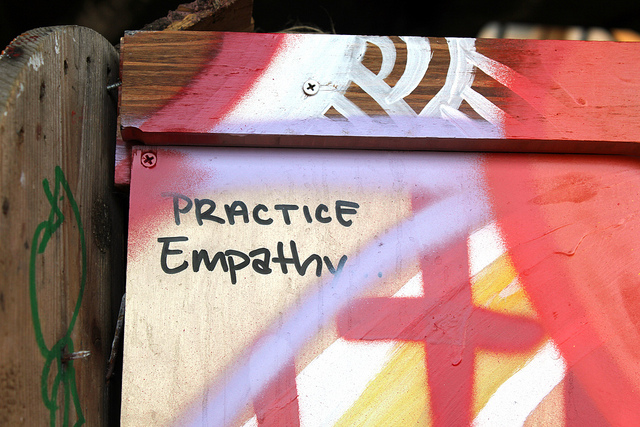Empathy: Why It’s Important & 6 Ways to Increase It
Empathy is the ability to understand and feel sensitivity toward the feelings of others. Many of us may make lighthearted, Clinton-esque I-feel-your-pain jokes, but really, if you’re an empathetic person, this is exactly what you do: understand someone else’s feelings. Empathy is a huge contributor toward the success of individual relationships. Additionally, some experts believe that the ability to feel empathy is one of the most important skills in the business world today.
Exhibiting empathy toward coworkers, clients, family members, and essentially every individual with whom you come in contact makes you see the world through the eyes of others and understand that your view of a particular situation may not be everyone else’s view. More than that, though, practicing empathy makes you a better communicator, reduces your prejudices, improves your overall well being, and earns you a reputation as a good person to do business with.
Of course, being empathetic takes some patience and some practice. How can you boost your ability to empathize? Here are five approaches to try.
- Put yourself in their shoes. It can be hard to understand the motives and behaviors of others, but that’s because you’re looking at them from a very specific point of view: your own. Instead, as the old saying goes, turn the tables, put yourself in their shoes, and see if you can make a bit more sense out of the other person’s logic. Doing so can take you from “why” to “aha.”
- Read fiction. Good literary fiction puts readers inside the minds of some pretty compelling characters. We get to understand how they think and why they behave in a certain way, which is exactly what we need to do in order to empathize more with others. This isn’t just conjecture, either; a 2013 study published in Science supported the idea that reading fiction improves theory of mind, or the ability to recognize that other people have their own individual needs, beliefs, and points of view.
- Listen actively. When someone else is talking, listen. Don’t just hear their voice and think about how you’re going to respond — quiet your interior monologue and pay close attention to the other person’s words, inflection, and nonverbal cues. You’ll not only be able to respond more accurately and genuinely, but you’ll become privy to lots of new information and more and more people recognize you as a person who will listen to their concerns without judging or interrupting.
- Talk the talk. Even if you’re not feeling particularly empathetic toward a given person, act like you do. Use phrases like “I understand” or “That makes sense” when listening to another person’s point of view. When other people hear these validating statements, they feel like you understand their point of view and recognizing why they feel a certain way.
- Be curious about the lives of others. Jumping off on the recommendation to read fiction, find out about people’s real life stories. Everyone has a complicated and interesting history, and finding out about it helps you to understand the attitudes and emotions that they bring to work and everyday life. Not only does this approach make you more empathetic, but it turns a group of strangers into a community of friends.
- Be grateful. Take some time on a regular basis (every day if you can) to pause and count your blessings. Be honest: you’ve probably got a pretty good life. Sure, you might be more stressed out than you’d like, and there are probably a few things in your world that could be going a little better, and you wouldn’t be human if there weren’t some things bothering you, but on the whole? Chances are, you’ve got a lot to be grateful for. Appreciate what you’ve got, and it will put you in a better mindset to understand the ups and downs of the lives of others.
How is your own personal empathy quotient? Many of us could probably improve in this department, but the good news is that empathy is something that can definitely be improved. I’ve given you six ways to practice in your quest to become a more empathetic person. Can you add to this list? Tell us in the comments.
Mark Jenney Mark Jenney on LinkedIn Mark Jenney Facebook Mark Jenney on Pinterest Source
